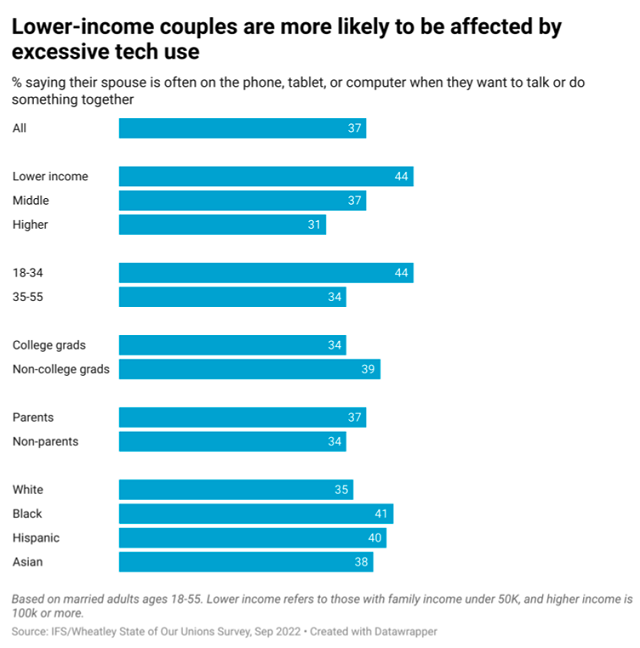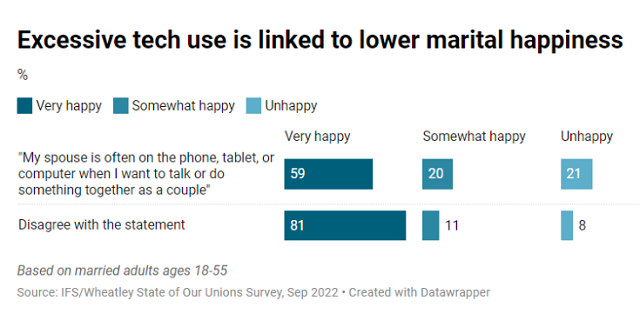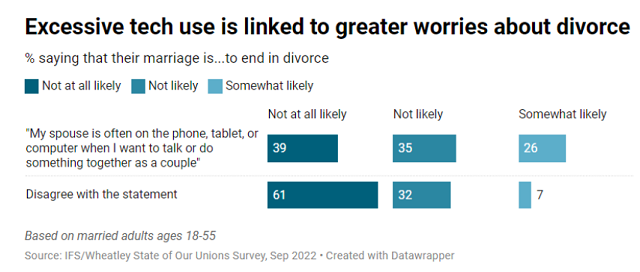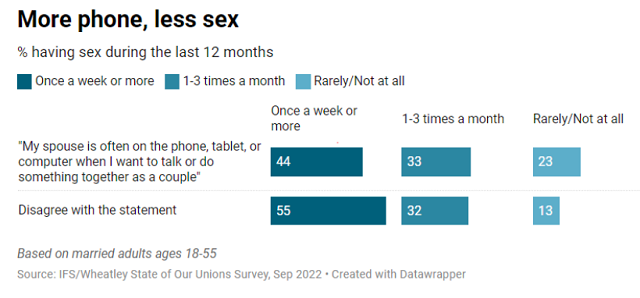Highlights
- More than one-third of married Americans (37%) say their spouse is often on the phone or a screen when they would prefer to talk or do something together as a couple. Post This
- 1 in 5 married adults (21%) with a spouse that overuses a phone say they are not happy with their marriage, compared to 8% of couples who do not report a phone issue. Post This
- Couples with greater control over their phones are more likely to report more frequent sex. Post This
Smartphones and social media were supposed to bring us closer together. But the more we learn about their effects, the more we see that these tools come with a price. Research by Jean Twenge and others has shown that teens who use social media excessively are more likely to experience depression, anxiety, and sleep deprivation. Recently, U.S. Surgeon General Vivek Murthy issued an advisory warning that social media are causing a profound mental health crisis among America’s children.
Even though most research on excessive smartphone usage focuses on teens and young adults, it does not mean that older Americans are immune to this issue. In the recent IFS teen and tech report with Jean Twenge, about 1 in 7 parents of teens (15%) said they use their phones or other digital devices “almost constantly” during conversations, meals, or family events. And there is growing evidence that our closest, most important relationships, such as our marriages and dating relationships, are suffering as a result. Using a sample of 145 adults, James Roberts and Meredith David found that “phubbing” (prioritizing one’s phone over people) among romantic partners leads to greater relationship dissatisfaction.
Reflecting on more than 25 years of practice, therapist Andrew Sofin recently observed:
Smartphones have caused more upheaval than anything I’ve seen in my career. We’ve normalized them being intrusive and taking precedence when people are lying in bed, playing Wordle or scrolling through TikTok rather than talking to each other.
How prevalent is excessive smartphone usage in marriage? Do all marriages suffer from phone addiction equally? What is the link between smartphones and marital quality? We take up these and other questions here.
The Demographics of Phone Distraction
More than one-third of married Americans (37%) say that their spouse is often on the phone or some kind of screen when they would prefer to talk or do something together as a couple, according to a new Institute of Family Studies/Wheatley Institute survey of 2,000 married couples ages 18 to 55. The phone problem is even worse among lower-income couples, with 44% indicating that their spouse is distracted by phones while they desire quality time together, compared with 31% of higher-income couples.

Younger couples are more likely to be distracted by their phone at home. A full 44% of married adults under age 35 say that their spouse is on the phone too much, compared with 34% of those aged 35-55. In addition, married adults without a college degree are more likely than college-educated adults to report that their spouse is distracted by their phone (39% vs. 34%). Meanwhile, husbands and wives are just as likely to feel left out because of their spouses’ overuse of a smart phone. Liberals and conservatives are equally affected, as are those who attend church regularly and those who do not.
Smartphones and Marital Quality
Excessive phone usage by a spouse leads to general frustrations, but it also is linked to more serious marital issues. In fact, couples who deal with excessive phone use are less happy about their marriage than others. Only about 6 in 10 married adults whose spouse is often on the phone (59%) say they are “very happy” with their marriage, compared with 81% of those who don’t struggle with this issue. More so, 1 in 5 married adults (21%) with a spouse that overuses a phone say they are not happy with their marriage, compared with only 8% of couples who do not report a phone issue.

Moreover, excessive phone usage is linked to greater worries about divorce. About a quarter of couples who lack control over their phones (26%) say their marriages may end in a divorce in the near or distant future. Among couples without a phone issue, only 7% say they are pessimistic about their marriage.

The link between smartphones and relationship quality remains significant in a multivariate model controlling for a range of factors such as age, gender, race, education, income, and whether couples have children. Holding all these factors constant, couples who experience phone distractions are about 70% less likely than other couples to be very happy with their marriage. Moreover, the odds of a future divorce perceived by these couples is four times higher than it is among couples who do not have a phone problem.
Two things may be contributing to lower marital satisfaction among couples who have a phone problem: less sex and fewer date nights. Fewer than half of these couples (44%) have sex once a week or more often, and about 1 in 5 of these couples (23%) report that either they haven’t had sex at all in the past 12 months (11%) or only once or twice (12%). In contrast, the couples with greater control over their phones are more likely to report more frequent sex.

Regular date nights are linked to happier marriages. Couples where one spouse is often on the phone, however, are less likely to go on dates. Nearly 6 in 10 of these couples (58%) say that they either do not have date nights or only have a date night a few times a year, compared to 48% of couples who do not have a phone problem.
Conclusion
It is difficult to determine for certain whether excessive phone use is the culprit of marital problems, given that addiction to phones may be an indicator of an already-unhappy marriage. Unhappy spouses might resort to using phones to escape and avoid communication with their partner. On the other hand, smartphones are engineered to be addictive. It is naïve to assume that adults would be totally immune to their design. The most likely scenario is that marital difficulty and addiction to smartphones are reinforcing each other, and that—without breaking out of the smartphone addiction—the underlying marital problems will be exacerbated to the breaking point and near impossible to address.
The fact that lower-income couples are more prone to distraction by phones at home is particularly troublesome. As we know, marriages are already more fragile for these couples and the marriage rate is much lower among lower-income and working-class Americans. The added strain of phone addiction further exacerbates the fragility of these marriages. Many troubled marriages have the potential to be healthier with some changes. Routine conversation, dates, and sex connect spouses and foster stability and happiness. A spouse spending more time on his or her phone will spend less time doing other things, such as reading a book, playing board games with the family, or connecting with family members. Addiction to smartphones crowds out the opportunity for couples to make time for one another. Time spent intentionally together is especially critical for low-income marriages, as the extended networks of such couples tend to be in a precarious state. In such a brittle social environment, spouses bear a greater psychological and relational load. Therefore, addiction to a device is a recipe for failure and, as we have seen, divorce.
In light of this, we recommend the following:
- Marriage and pre-marriage counselors should strongly urge couples to establish rules about the use of smartphones.
- Couples should voluntarily use basic phones that are designed to limit their functionality to the essentials—talk, text, email—to put themselves in the best position to overcome the addictive qualities of these devices.
- Social media companies should re-design their platforms to root out their most addictive features, such as infinite scroll.
- Community and national leaders should establish social norms around smartphones—e.g., at school, in church, throughout the media, and elsewhere—that frequent use in the company of others is unhealthy, except when necessary for technical purposes.
- Public or privately sponsored public service announcements should be launched to inform Americans about the dangers of smartphone addiction to one’s relationships, with a special effort to ensure that low-income Americans are fully educated about the risks.
Marriage is the thread that holds society together. For the sake of their families and for the good of society, spouses should be empowered to resist the technological forces that threaten to fray the marital bond.
Download the full research brief here.














